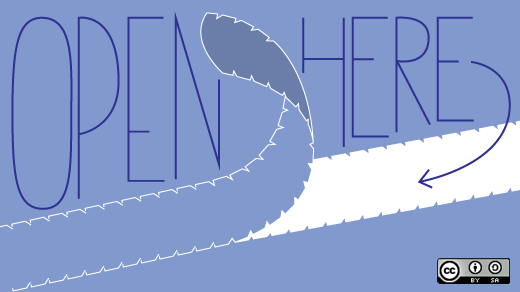Throughout our "Managing with Open Values" series, we've interviewed a number of managers and leaders who shared with us their experiences and practices. In this installment, I interviewed fellow Open Organization Ambassador Sam Knuth to discuss how he lets open values guide his approach to leading large teams.
Sam is the Senior Director of several teams at Red Hat, including Product Documentation and a team focused on the associate experience of our Products and Technologies organization. He's been with Red Hat for more than 15 years. For Opensource.com, he's authored articles focused on vulnerability and transparency in the workplace, and his stories about life as an open leader showcase a passion for those (and other) open values.
Among other reasons, I wanted to interview Sam because I wanted to learn about "how to lead and manage managers" using open values—that is, how to empower them to use open values in their management practices—and how this work differs from, say, managing front-line contributors. Because of the confidentiality of some of the answers (we are colleagues at Red Hat after all), I am summarizing the interview in a series of articles that highlight and share some of Sam's most memorable observations and practices.
Practicing transparency
When we think of "being transparent," many of us think of sharing information. For Sam, practicing transparency means sharing information candidly and consistently. As Sam defines it, transparency is "telling everyone everything I can."
During our conversation, Sam recounted a story from earlier in his career that helped shape this understanding. He had not adequately consulted or collaborated with people on a decision that he made and it was criticized on the company's internal mailing list. Associates might have expected he would respond by saying that the decision had been made and would continue as planned, but instead he apologized and humbly acknowledged other people's perspectives, reassuring associates that changes could be made to the decision. Through this mistake, he gained important knowledge about how meaningful it was to "over-share" or "over-collaborate" whenever possible, because doing so can expose potential problems sooner and allow others to contribute.
Sam has been candid about his experience of anxiety in the workplace, which he has turned into a positive tool. When he experiences fear and worry about an activity or decision—especially when he's worried about doing something alone he uses that signal to engage the help of others. In this case, he's not trying to avoid accountability (he's still ultimately responsible for getting something done or making a decision), but he doesn't need to (and shouldn't) "go solo." His radar helps him adapt to be more inclusive and transparent and collaborative with the community.
Listen to Sam Knuth describe his approach to making decisions.
But "going solo" is exactly what many conventional organizations expect executive leaders to do. They're supposed to be experts (I call this the "one-man myth," the perpetual story about one man single handedly creating/managing a major activity). The "one man myth" discourages leaders from making (and sharing) mistakes or changing course—it is, in fact, a symptom of perfectionism—that's not only in opposition to open organization principles, but can also contribute to, and reflect, a lack of innovative culture. Make a mistake? Never.
But mistakes happen all the time during periods of innovation and creativity, so neither of those can exist in a culture of perfectionism. Contrast that with the culture of many open organizations, where Sam's practice of not working alone affords him incredible perspectives and views he wouldn't ordinarily have.
Listen to Sam Knuth explain the importance of making mistakes and receiving feedback.
Executive leadership differences
In fact, these broadly impactful decisions are one thing that separates executive leaders and managers—as one "goes up" the hierarchy, one's decisions can affect larger groups of people in ways that are sometimes unforeseen. For open leaders, this presents an incredible opportunity to create a collaborative forum for discussing these hidden impacts and including others in decision-making. However, not preparing for or understanding this difference illustrates a nuanced gap in leadership skills.
The fact that front line managers' decisions are most impactful to their team, whereas executive leader's decisions can be more broadly impactful across an organization, means that the leader's approach to leading must change over time, underscoring the importance of practicing open values often and early in a manager's career. Learning to be inclusive, adaptable, and collaborative is easier when managers have frequent interactions with the individual contributors on their team, can clearly see the impact their decisions have, and they can admit and correct mistakes more readily, without significant repercussions or widespread criticism. Learning these skills is never easy, but in the context of front-line managers, it means the impact is smaller, more granular—and, in the case of mistakes, potentially more forgiving.
Skills learned from managing front-line, individual contributors are foundational to managing with open values at the executive leadership level, my conversation with Sam taught me. It can be really difficult to hire executive leaders into an open organization, because candidates haven't learned solid open management practices from the start. These foundational skills only translate because people who learned how to lead in an open environment intuitively understand the values, learned them, and go out of their way to be open. They cannot "just be open" with their direct-report managers; they have to be transparent and inclusive with all associates in their organization (and maybe even across the business), where decisions have broader and longer-lasting impacts. They need to admit mistakes, even when doing so may lead to significant repercussions and widespread criticism. So it's important that executive leaders be prepared for this difference and have the skills (and courage) to rise to the occasion and be open in that context.
Stay tuned for the next installment of this series, a continuation of my interview with Sam Knuth that will focus on how executive leaders support their managers and teams in using open values.









Comments are closed.